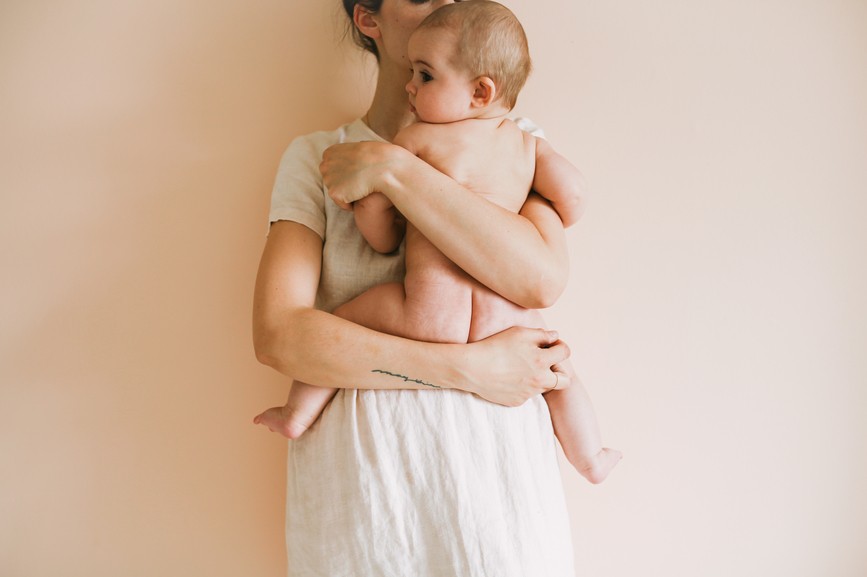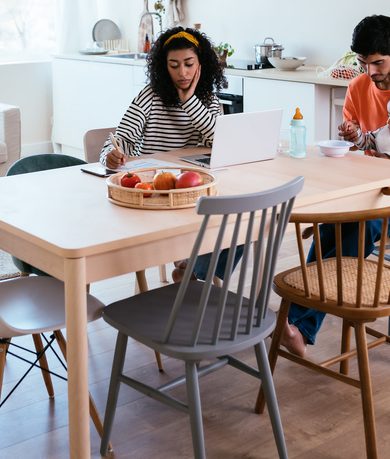Disclaimer: This article is an account of my feelings. They are part of my truth,…
Change
I Left An Abusive Relationship One Month After My Daughter Was Born
June 28, 2021 • By Lindsay Love

I met my daughter’s father at the age of twenty-one and became pregnant one month later.
I was 21 years old and had been raised by my mother who grew up without her mother, so it is safe to say my understanding of relationship dynamics was flawed.
So, when my daughter’s father became more controlling during my pregnancy, it seemed innocuous to me. He requested I cut certain people out of my life who he’d decided were no longer good for me. Since we were building a family together and moving into a new phase of life, he had a point.
Then, he started hovering over me as I pleaded hysterically for him to leave me alone. I needed my own space physically and mentally as I figured out what was happening in my life and in my body. He ignored me and continued to follow me around the house, taunting me, until I eventually barricaded myself in the bathroom.
I spent months attempting to rationalize his behavior. I tried convincing myself it “wasn’t that bad.” I told myself having two parents would be better for my baby. This would be part of my healing and in turn, my mother’s healing from our flawed upbringing. I tried to talk to him about it, but every conversation left me questioning my own sanity. I now know these are signs of narcissistic and emotional abuse. I didn’t know that at 21. There was a lot I didn’t know then.
When my daughter was born, I felt numb. Not in relation to her persay, but with myself. And with him. I didn’t totally understand what was happening, but I knew something was wrong and had to change. I had to get out of this relationship and away from this man. I needed to protect my daughter from every feeling the way I felt. I needed to stop this cycle of generational trauma.
My daughter was only one month old when I left. I had nothing but a mattress pad and a bag of clothes with a picture of her sonogram in the front pouch. I sought sanctuary in my best friend’s spare bedroom. That first night I remember curling up next to her, feeling bleak and empty. I knew I had done the right thing. For myself and my daughter. But I didn’t know more than that. I hadn’t even been to a postpartum checkup with my doctor, I was still bleeding, and I packed up our life and left her dad. I was still healing, waking up every 2-3 hours to feed her, and did it all alone.
I didn’t know that the years ahead of me would be filled with continued psychological abuse by her father. I thought I had saved us from that. But narcissists don’t give up that easily. He and I had been involved for one year. A month before I got pregnant, ten months of pregnancy, and one month of life with our daughter. And yet, that year changed everything. I couldn’t escape him. I tried to navigate being a young, single mother without a support system and quickly realized that all of the odds were stacked against me. They are stacked against all single women. And mothers.
So, as a single mother it didn’t take long for me to realize I was screwed. Because of my upbringing, my inherited trauma, and the abuse in my relationship, I internalized these struggles. They were all my fault for choosing to leave.
When I had my daughter in 2008, the conversation around gender equality was still reserved for institutions of higher education. Thankfully, in the past thirteen years, society started to understand the effects of the gender wage gap, intergenerational trauma, race, and structures of systemic oppression. And how these shape the access to resources for single mothers and their cultural perception.
On average, white women are paid just shy of .80 cents for every dollar a white man makes. That number quickly decreases based on race: Latinx women make the least to their white male counterparts at .54 cents per every dollar,* a factor that puts these women at an immediate economic disadvantage to raising children successfully in general and as compared to single fathers.
Add to this the inflexibility and lack of parental support in America, ever-rising cost of living and childcare, life becomes a logistical nightmare for most single mothers. This was hard pre Covid and now it’s an actual nightmare. Between February and August 2020, single mothers lost 16% of jobs, compared to just 6% of single fathers.* I knew this already, but this served as a reminder of how much our culture does not support mothers, and certainly not single mothers.
Socially, the stigma of single motherhood pervades so much of American culture. In 2011 NPR conducted a survey of over 3,000 individuals with Rich Morin, Senior Editor of Pew Research and found that society’s tolerance to atypical family structures (those outside of the nuclear, heteronormative paradigm) was largely positive. When asked about single mothers, however, over 99% of people believed it was bad for society. 99% of people believe that I am bad for society because I left an abusive relationship to protect myself and my daughter.
Without a support system or community to lean on and the continued abuse from my ex, my body internalized the mantras of shame. I regularly questioned my sanity. I accepted that everything was my fault. I spiraled mentally and emotionally. I felt lost, confused, and I was unable to regulate my emotions. I resented my child, but couldn’t admit it. I blamed myself for the way I felt. I fantasized about running away so I drank heavily. I partied as often as I could. I gave my body away to anyone who wanted it. I hated myself. Nobody noticed. And those who did, seemed not to care.
As I had learned from generations before me, I pretended that nothing was wrong. I tried to keep up with all of the demands society expects of a two-parent household. Superwoman working mom, bakesale organizer, all of the lessons a day could hold, you know the drill.
Meanwhile, I was barely able to stay afloat financially, mentally, emotionally, and physically. At my daughter’s school I was rarely included in community gatherings by the other moms. At my jobs, I was expected to work in the same capacity as those who did not have children without any flexibility or grace when I’d show up late or couldn’t make my schedule work due to lack of childcare. I was an outsider to my peers. I maintained the appearance of being “fine” despite the desperation I felt. I knew that if it doesn’t leave a visible mark, people don’t believe you.
As I write this, I am in the midst of yet another custody battle. I must prove, once again, that I am worthy of caring over the human I created, birthed, loved, and spent over a decade fighting for. I hope I get to announce a happy ending at some point.
Things are improving though. I am now educated about these systemic issues. I am fully committed to my own healing. I know how to identify and call abuse by its rightful name and I am committed to calling it out as loudly and often as needed. I use my voice, boldly and unapologetically. Because when you shed light on the darkness, it no longer has a place to hide.
We live in a society where we are taught to blame the victim instead of the system that creates and perpetuates social inequality. And we need to change this narrative. Now.
How do we do this? We stop focusing on what the mother should do differently. We stop questioning why she chose to leave her child’s other parent. We start listening to and believing women. Mothers. Victims of abuse. Survivors. Fighters. We stop blaming them for creating the situation and start investigating how and why there are no support systems available.
Now that I can finally speak out about and share my own experience of abuse, I know that I need to. I have a duty toward all of the single moms out there, the moms in abusive relationships, the moms who are working too much to speak up and advocate for them. For us and for me.
*Sources:


